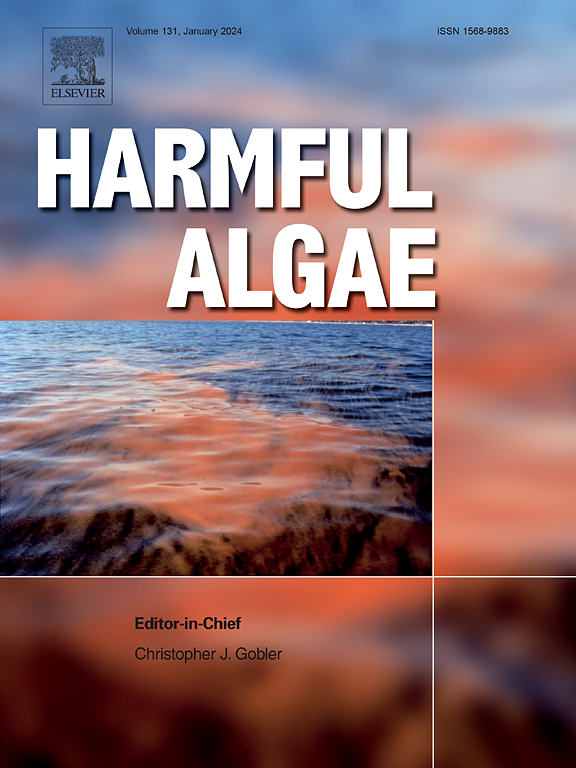Discovery of novel and known viruses associated with toxigenic and non-toxigenic bloom forming diatoms from the Northern Adriatic Sea
IF 5.5
1区 生物学
Q1 MARINE & FRESHWATER BIOLOGY
引用次数: 0
Abstract
Algal blooms impact trophic interactions, community structure and element fluxes. Despite playing an important role in the demise of phytoplankton blooms, only few viruses infecting diatoms have been cultured. Pseudo-nitzschia is a widespread diatom genus that commonly blooms in coastal waters and contains toxin-producing species. This study describes the characterization of a novel virus infecting the toxigenic species Pseudo-nitzschia galaxiae isolated from the northern Adriatic Sea. The ssRNA virus PnGalRNAV has 29.5 nm ± 1.2 nm icosahedral virions and a genome size of 8.8 kb. It belongs to the picorna-like Marnaviridae family and shows high specificity for P. galaxiae infecting two genetically and morphologically distinct strains. We found two genetically distinct types of this virus and screening of the global virome database revealed matching sequences from the Mediterranean region and China, suggesting its global distribution. Another virus of similar shape and size infecting Pseudo-nitzschia calliantha was found, but its genome could not be determined. In addition, we have obtained and characterized a new virus that infects Chaetoceros tenuissimus. The replicase protein of this virus is very similar to the previously described ChTenDNAV type-II virus, but it has a unique genome and infection pattern. Our study is an important contribution to the collective diatom virus culture collection and will allow further investigation into how these viruses control diatom bloom termination, carbon export and toxin release in the case of Pseudo-nitzschia.

发现与北亚得里亚海有毒和无毒水华形成硅藻有关的新型和已知病毒
藻华影响营养互作、群落结构和元素通量。尽管病毒在浮游植物藻华的消亡过程中扮演着重要角色,但感染硅藻的病毒却很少被培养出来。假硅藻(Pseudo-nitzschia)是一种广泛分布的硅藻属,通常在沿海水域大量繁殖,并含有可产生毒素的物种。本研究描述了一种新型病毒的特征,该病毒感染了从亚得里亚海北部分离出来的产毒硅藻。ssRNA 病毒 PnGalRNAV 有 29.5 nm ± 1.2 nm 的二十面体病毒,基因组大小为 8.8 kb。它属于类皮卡病毒(picorna-like Marnaviridae)科,对加拉克希藻(P. galaxiae)具有高度特异性,可感染两种基因和形态上截然不同的毒株。我们发现了该病毒的两种不同基因类型,通过筛选全球病毒组数据库发现了来自地中海地区和中国的匹配序列,这表明该病毒分布于全球。我们还发现了另一种形状和大小相似的病毒,感染了假茑萝,但无法确定其基因组。此外,我们还获得并鉴定了一种感染 Chaetoceros tenuissimus 的新病毒。这种病毒的复制酶蛋白与之前描述的 ChTenDNAV II 型病毒非常相似,但它有独特的基因组和感染模式。我们的研究是对硅藻病毒集体培养收集的一个重要贡献,将有助于进一步研究这些病毒是如何控制硅藻藻华终止、碳输出和毒素释放的。
本文章由计算机程序翻译,如有差异,请以英文原文为准。
求助全文
约1分钟内获得全文
求助全文
来源期刊

Harmful Algae
生物-海洋与淡水生物学
CiteScore
12.50
自引率
15.20%
发文量
122
审稿时长
7.5 months
期刊介绍:
This journal provides a forum to promote knowledge of harmful microalgae and macroalgae, including cyanobacteria, as well as monitoring, management and control of these organisms.
 求助内容:
求助内容: 应助结果提醒方式:
应助结果提醒方式:


